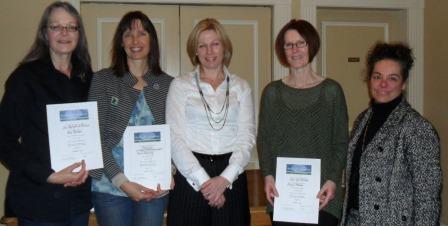Results of the 2014 CompetitionFirst: ‘Scars’ by Megan Frith (Auckland)
Second: ‘Sex, Religion and Politics’ by Wix Hutton (Nelson) Third: ‘Into My Arms’ by Jane Buxton (Christchurch) Highly Commended: ‘Always A Good Woman’ by Frances Cherry (Wellington) ‘The Bump On My Knee’ by Kay Elwyn (New Plymouth) ‘Mr Bloxen’ by Nod Ghosh (Christchurch) ‘Terminal Velocity’ by Eileen Merriman (Auckland) ‘Detritus: (n) waste or debris of any kind’ by Tania Norfolk (Nelson) ‘Save Your Breath’ by Angela Wilson (Wellington) ‘Dried Apricots’ by Shona Wilson (New Plymouth) The results were announced on 10 June 2014 at the Prince Albert Hotel, Nelson, by Paula Browning, CEO of Copyright Licensing NZ. The photo on the right was taken at the event. The winning stories were published in the anthology Horizons 2 The judge of the competition, Graeme Lay, provided this report: The ten finalists were all of a high standard, the best exceptionally so. However after several readings and re-readings, the best of the ten became more evident. There were four stories in particular which lingered in my consciousness, and these were the ones to which I returned, time and again. All were well conceived and dextrously executed, the work of accomplished writers, and there was very little between them. But the ultimate test of literary excellence is the ability of the writer’s characters to work their way into the reader’s mind and remain there. When this happens the writer has succeeded. Moreover, the reader is left wondering, Yes, and what happened after that?, thus continuing the story in his or her own thoughts. This demonstrates that the writer has successfully created characters and circumstances which have truly assumed a life of their own. The best stories also work through the power of suggestion, a ‘reading between the lines’ technique, a variation of the maxim ‘show don’t tell’. Although this is very difficult to achieve, particularly when the stipulated word total is limited, the four best stories all possessed this quality of subtle intimation. It’s a vital aspect of the short story writer’s art. The four stories were read several more times, then set aside. This is what judges in law usually do – reserving their decision in order to allow the assessment process to settle and become clearer in their minds. Then they declare their verdict. Literary judgements work in much the same way. After a few days of further contemplation, I decided on the winner. |




